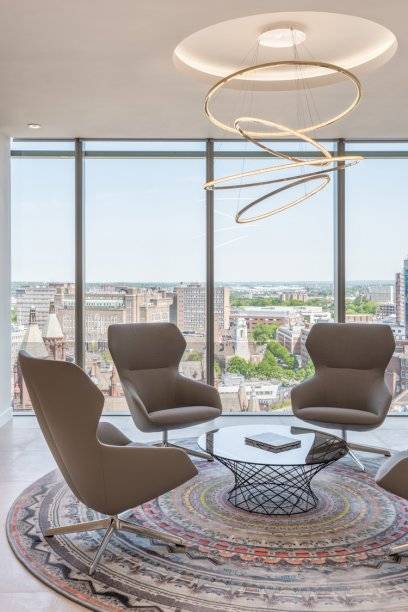 Strong office space take-up is predicted for this year after activity from law firms was down in 2017 against 10-year averages and compared to other sectors. Many legal companies are anticipating how their approach to workspace might have to change. This includes trialling new ways of working and years of overreliance on private offices. The legal sector is compared to many other services’ professions “closed” – and therefore ripe for change. There is an abundance of technology start-ups looking to introduce disruptive tech that will render many legal roles obsolete. The sector is also haemorrhaging senior talent as experienced professionals leave and the sector has failed thus far to adapt to modern working conventions including the agile workplace. Despite working in the digital age of wireless tech and cloud computing, 64 percent of lawyers found it difficult to work remotely because their technology wasn’t suitable (according to research from Lexis Nexis).
Strong office space take-up is predicted for this year after activity from law firms was down in 2017 against 10-year averages and compared to other sectors. Many legal companies are anticipating how their approach to workspace might have to change. This includes trialling new ways of working and years of overreliance on private offices. The legal sector is compared to many other services’ professions “closed” – and therefore ripe for change. There is an abundance of technology start-ups looking to introduce disruptive tech that will render many legal roles obsolete. The sector is also haemorrhaging senior talent as experienced professionals leave and the sector has failed thus far to adapt to modern working conventions including the agile workplace. Despite working in the digital age of wireless tech and cloud computing, 64 percent of lawyers found it difficult to work remotely because their technology wasn’t suitable (according to research from Lexis Nexis).
My own firm has assessed more than 30 recent mergers and acquisitions in the UK’s legal sector and more than 100 in the US where there has been shift to open plan from private offices. Space for focus-orientated tasks has become a real factor as a result. Looking at the legal sector over time, lawyers invariably require 73% of the working day for focus compared to just 60% in other sectors. But even with the specificity of this criteria in mind, boundaries are beginning to blur between privacy and proximity. And it is important to remove the ‘guilt’ factor of teams of team-orientated tasks and what qualifies as “work”. But the focus on billable time makes it a very different proposition for the legal workplace.
 Lawyers can spend 45 minutes filing per day – overwhelming admin resulted in a loss of 65,000 euros in billable time per year according to industry research. Firms need to stop losing time, productivity, and encouraging poor morale via outmoded working practice if they are to remain competitive. One of the primary issues for this is paper – lawyers need to embrace the paperless office! Not least for the environmental impact but also to optimise office space capacity and improve the security implications of millions of files of stored paper.
Lawyers can spend 45 minutes filing per day – overwhelming admin resulted in a loss of 65,000 euros in billable time per year according to industry research. Firms need to stop losing time, productivity, and encouraging poor morale via outmoded working practice if they are to remain competitive. One of the primary issues for this is paper – lawyers need to embrace the paperless office! Not least for the environmental impact but also to optimise office space capacity and improve the security implications of millions of files of stored paper.
The inflexible approach to the workplace across the sector also impacts its ability to retain female talent at all levels of the business by diminishing working flexibility. With two-thirds of the legal workforce made up of women, this is a significant issue. To professionals working in other sectors it may seem an anathema but ease of access to information, an increase in portability as it were, can transform legal working practice but is near impossible with the current reliance on paper.
The sector now needs to address the exodus of those leaving the profession, and how the legal workplace needs to broaden its appeal for all of the workforce. Lawyers need to be more empathetic and understand the workplace user’s needs and expectations. The next generation of contracts will see a more proactive law, in which the sector moves away from sameness.
There are numerous ways that AI could play a role in law – from analytics to electronic discovery processes. Contract analytics, expertise automation, and platforms can be tailored to situations and the users (insert ‘printer’ analogy – old litho press vs. digital production). For example, with contract reviews: it took a robot 30 seconds to do what it takes a human two hours to undertake – a considerable saving in time and billing. In the future of the legal workplace, humans should be the ones to imagine, be creative, and challenge attitudes. Risk aversion and risk management can be tech-led.
A project that we have worked on for the past year in Birmingham demonstrates that attitudes in the sector are changing, and that there is a recognition of the challenges legal firms in terms of recruitment. This is a city market that global blue chips are taking very seriously and there is a significant war for talent as the local employment market heats up. In my view, it is representative of a new approach from law firms more broadly.
The legal sector is already undergoing significant change and the law firm of the future is going to look very different to its current form. With efficiencies driven by AI, removing many procedural tasks from junior employees and para-legals, it would seem an obvious conclusion to anticipate the legal profession moving to a more creative, consultancy-based mindset. If this is the case, then we will see new workplace configurations not just because of the obvious efficiencies of agile working but its ability to tailor to task-orientated spaces.
_________________________________________
 Simon Pole, is Global Director, Design at Unispace
Simon Pole, is Global Director, Design at Unispace

























October 16, 2018
Law firms are finally embracing the agile workplace
by Simon Pole • Comment, Workplace design
My own firm has assessed more than 30 recent mergers and acquisitions in the UK’s legal sector and more than 100 in the US where there has been shift to open plan from private offices. Space for focus-orientated tasks has become a real factor as a result. Looking at the legal sector over time, lawyers invariably require 73% of the working day for focus compared to just 60% in other sectors. But even with the specificity of this criteria in mind, boundaries are beginning to blur between privacy and proximity. And it is important to remove the ‘guilt’ factor of teams of team-orientated tasks and what qualifies as “work”. But the focus on billable time makes it a very different proposition for the legal workplace.
The inflexible approach to the workplace across the sector also impacts its ability to retain female talent at all levels of the business by diminishing working flexibility. With two-thirds of the legal workforce made up of women, this is a significant issue. To professionals working in other sectors it may seem an anathema but ease of access to information, an increase in portability as it were, can transform legal working practice but is near impossible with the current reliance on paper.
The sector now needs to address the exodus of those leaving the profession, and how the legal workplace needs to broaden its appeal for all of the workforce. Lawyers need to be more empathetic and understand the workplace user’s needs and expectations. The next generation of contracts will see a more proactive law, in which the sector moves away from sameness.
There are numerous ways that AI could play a role in law – from analytics to electronic discovery processes. Contract analytics, expertise automation, and platforms can be tailored to situations and the users (insert ‘printer’ analogy – old litho press vs. digital production). For example, with contract reviews: it took a robot 30 seconds to do what it takes a human two hours to undertake – a considerable saving in time and billing. In the future of the legal workplace, humans should be the ones to imagine, be creative, and challenge attitudes. Risk aversion and risk management can be tech-led.
A project that we have worked on for the past year in Birmingham demonstrates that attitudes in the sector are changing, and that there is a recognition of the challenges legal firms in terms of recruitment. This is a city market that global blue chips are taking very seriously and there is a significant war for talent as the local employment market heats up. In my view, it is representative of a new approach from law firms more broadly.
The legal sector is already undergoing significant change and the law firm of the future is going to look very different to its current form. With efficiencies driven by AI, removing many procedural tasks from junior employees and para-legals, it would seem an obvious conclusion to anticipate the legal profession moving to a more creative, consultancy-based mindset. If this is the case, then we will see new workplace configurations not just because of the obvious efficiencies of agile working but its ability to tailor to task-orientated spaces.
_________________________________________